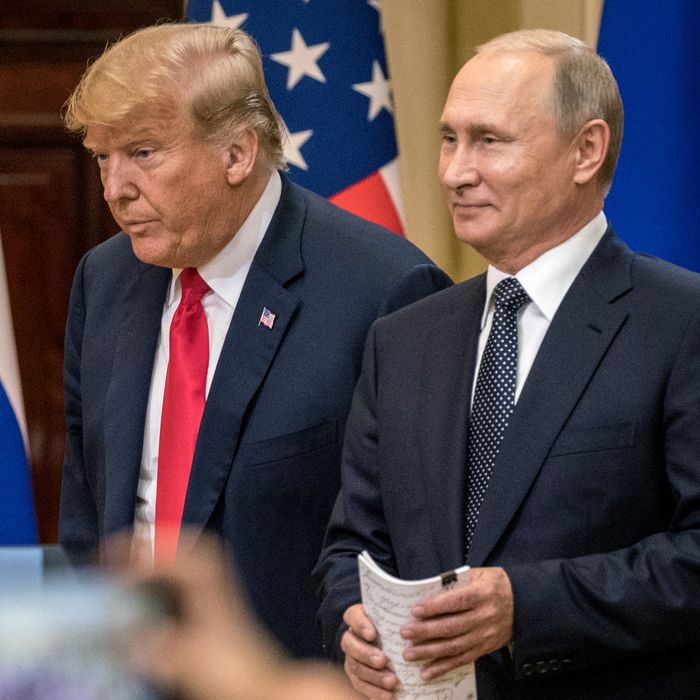ven the ‘Innocent’ Story of Trump’s Response to the Russian Bounty Is Damning

Photo: Chris McGrath/Getty Images
In January, officials at “the highest levels of the White House” were informed that Russia had paid the Taliban a bounty to kill American troops in Afghanistan. Since that time, Trump has held five known phone calls with Vladimir Putin: on March 30, April 9, April 10, April 12, and June 1. The administration has not even claimed to have warned off Russia, let alone taken retaliatory action.
The America First, bully-boy president’s shocking passivity in the face of a threat to the troops whose welfare he claims to cherish so dearly has a couple of basic categories of explanation.
The first is that he is, in some form or fashion, still in hoc to Putin. Years of courting and flattery seem to have convinced Trump to see Russia’s side of a wide array of issues, from NATO to G7 membership to the alleged threat to Russia posed by countries like Montenegro and Afghanistan. The Mueller investigation found that Putin dangled a secret payoff of several hundred million dollars during the campaign. If he is currently receiving payments from Russian sources now, the public would have no way to know, as Trump has (with broad support from his party) blocked legally required disclosure of his financial information. Trump’s operation to produce a Ukrainian investigation of Joe Biden was financed at least in part by a Russian oligarch.
It is possible none of these secret considerations really bears on his Russia policy. The criminal investigation of Trump and Russia hit a dead end at Paul Manafort and Roger Stone, and the result of the apparently separate counterintelligence investigation is completely unknown. But this would still leave a puzzling void in the weaselly denials issued by Trump and his spokespeople.
As usual, the administration has produced a menu of responses, allowing its supporters to choose which level of denial they wish to pick, depending on their personal level of commitment to the Trump personality cult. Trump himself has dismissed the “so-called” attacks, and then — in the same message! — retreated to the defense that there have “not been many” attacks on American forces:
“We’ve only been attacked a few times” would, of course, confirm the reports, not deny them.
In a subsequent message, Trump called the entire report of Russian bounties a hoax and blamed it on The New York Times Book Review section:
While Trump is a well-known bibliophobe, it seems more likely that he mistyped the target of his conspiracy theory than that he attempted to suggest the Times’ Russian bounty report was orchestrated by its literary section.
The original Times scoop has been confirmed by other American media and European intelligence sources. Other administration officials have tried to draw a less obviously indefensible line. Over the weekend, the White House press secretary and director of National Intelligence denied that “the president nor the vice-president were briefed” on Russia’s involvement. This would seem to push responsibility away from Trump and onto a nebulous bureaucratic failure.
Yet the administration conspicuously failed to deny the Times report that the bounty intelligence was included in the President’s Daily Brief. The gap between Trump “being briefed” on the Russian bounty, and information on the bounty being included in his brief, may sound merely semantic. But Trump is known not to read his brief, instead relying on a verbal summary from intelligence officials.
The Washington Post reported three years ago that the officials who deliver Trump’s intelligence summaries have learned to dance carefully around anything that casts a dark light on Putin. “Russia-related intelligence that might draw Trump’s ire is in some cases included only in the written assessment and not raised orally,” it found, noting that briefers have learned that Russian-related intelligence tends to send the briefing “off the rails.”
And so the Russian bounty might well have been included in Trump’s official briefings, which everybody knows he doesn’t read. And the officials around him may well have decided not to mention the matter to him because experience has taught them not to broach the topic of Russian misconduct with the boss.
Trump’s advisers almost certainly do not know why the topic of Russia is so triggering to him. But if his sensitivity is so acute that they could not even bring up a scheme to finance attacks on the American military — a literal act of war — then the effect is tantamount to the worst-case scenario. Whatever the reason, Trump is functionally unable to handle American policy toward Russia.
No comments:
Post a Comment